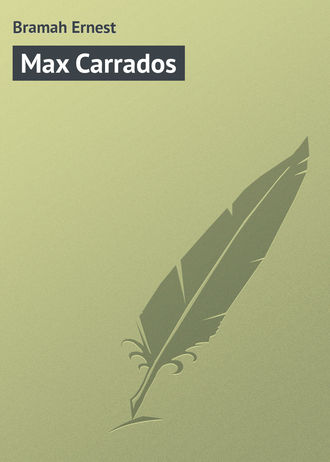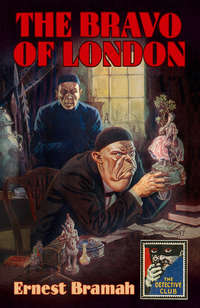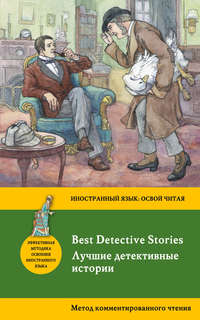 полная версия
полная версияMax Carrados
“Well, we still hope to be able to report something to-morrow. Good-bye.”
It was with an effort that Mr Carlyle straightened himself sufficiently to take leave of the Manager. Several times in the corridor he stopped to wipe his eyes.
“Max, you unholy fraud,” he said, when they were outside, “you knew all the time.”
“No; I told you that I knew nothing of it,” replied Carrados frankly. “I am absolutely sincere.”
“Then all I can say is, that I see a good many things happen that I don’t believe in.”
Carrados’s reply was to hold out a coin to a passing newsboy and to hand the purchase to his friend who was already in the car.
“There is a slang injunction to ‘keep your eyes skinned.’ That being out of my power, I habitually ‘keep my ears skinned.’ You would be surprised to know how very little you hear, Louis, and how much you miss. In the last five minutes up there I have had three different newsboys’ account of this development.”
“By Jupiter, she hasn’t waited long!” exclaimed Mr Carlyle, referring eagerly to the headlines. “‘PEARL NECKLACE SENSATION. SOCIETY LADY’S ₤5000 TRINKET DISAPPEARS.’ Things are moving. Where next, Max?”
“It is now a quarter to one,” replied Carrados, touching the fingers of his watch. “We may as well lunch on the strength of this new turn. Parkinson will have finished packing; I can telephone him to come to us at Merrick’s in case I require him. Buy all the papers, Louis, and we will collate the points.”
The undoubted facts that survived a comparison were few and meagre, for in each case a conscientious journalist had touched up a few vague or doubtful details according to his own ideas of probability. All agreed that on Tuesday evening – it was now Thursday – Mrs Straithwaite had formed one of a party that had occupied a box at the new Metropolitan Opera House to witness the performance of La Pucella, and that she had been robbed of a set of pearls valued in round figures at five thousand pounds. There agreement ended. One version represented the theft as taking place at the theatre. Another asserted that at the last moment the lady had decided not to wear the necklace that evening and that its abstraction had been cleverly effected from the flat during her absence. Into a third account came an ambiguous reference to Markhams, the well-known jewellers, and a conjecture that their loss would certainly be covered by insurance.
Mr Carlyle, who had been picking out the salient points of the narratives, threw down the last paper with an impatient shrug.
“Why in heaven’s name have we Markhams coming into it now?” he demanded. “What have they to lose by it, Max? What do you make of the thing?”
“There is the second genuine string – the one Bellitzer saw. That belongs to someone.”
“By gad, that’s true – only five days ago, too. But what does our lady stand to make by that being stolen?”
Carrados was staring into obscurity between an occasional moment of attention to his cigarette or coffee.
“By this time the lady probably stands to wish she was well out of it,” he replied thoughtfully. “Once you have set this sort of stone rolling and it has got beyond you – ” He shook his head.
“It has become more intricate than you expected?” suggested Carlyle, in order to afford his friend an opportunity of withdrawing.
Carrados pierced the intention and smiled affectionately.
“My dear Louis,” he said, “one-fifth of the mystery is already solved.”
“One-fifth? How do you arrive at that?”
“Because it is one-twenty-five and we started at eleven-thirty.”
He nodded to their waiter, who was standing three tables away, and paid the bill. Then with perfect gravity he permitted Mr Carlyle to lead him by the arm into the street, where their car was waiting, Parkinson already there in attendance.
“Sure I can be of no further use?” asked Carlyle. Carrados had previously indicated that after lunch he would go on alone, but, because he was largely sceptical of the outcome, the professional man felt guiltily that he was deserting. “Say the word?”
Carrados smiled and shook his head. Then he leaned across.
“I am going to the opera house now; then, possibly, to talk to Markham a little. If I have time I must find a man who knows the Straithwaites, and after that I may look up Inspector Beedel if he is at the Yard. That is as far as I can see yet, until I call at Luneburg Mansions. Come round on the third anyway.”
“Dear old chap,” murmured Mr Carlyle, as the car edged its way ahead among the traffic. “Marvellous shots he makes!”
In the meanwhile, at Luneburg Mansions, Mrs Straithwaite had been passing anything but a pleasant day. She had awakened with a headache and an overnight feeling that there was some unpleasantness to be gone on with. That it did not amount to actual fear was due to the enormous self-importance and the incredible ignorance which ruled the butterfly brain of the young society beauty – for in spite of three years’ experience of married life Stephanie Straithwaite was as yet on the enviable side of two and twenty.
Anticipating an early visit from a particularly obnoxious sister-in-law, she had remained in bed until after lunch in order to be able to deny herself with the more conviction. Three journalists who would have afforded her the mild excitement of being interviewed had called and been in turn put off with polite regrets by her husband. The objectionable sister-in-law postponed her visit until the afternoon and for more than an hour Stephanie “suffered agonies.” When the visitor had left and the martyred hostess announced her intention of flying immediately to the consoling society of her own bridge circle, Straithwaite had advised her, with some significance, to wait for a lead. The unhappy lady cast herself bodily down upon a couch and asked whether she was to become a nun. Straithwaite merely shrugged his shoulders and remembered a club engagement. Evidently there was no need for him to become a monk: Stephanie followed him down the hall, arguing and protesting. That was how they came jointly to encounter Carrados at the door.
“I have come from the Direct Insurance in the hope of being able to see Mrs Straithwaite,” he explained, when the door opened rather suddenly before he had knocked. “My name is Carrados – Max Carrados.”
There was a moment of hesitation all round. Then Stephanie read difficulties in the straightening lines of her husband’s face and rose joyfully to the occasion.
“Oh yes; come in, Mr Carrados,” she exclaimed graciously. “We are not quite strangers, you know. You found out something for Aunt Pigs; I forget what, but she was most frantically impressed.”
“Lady Poges,” enlarged Straithwaite, who had stepped aside and was watching the development with slow, calculating eyes. “But, I say, you are blind, aren’t you?”
Carrados’s smiling admission turned the edge of Mrs Straithwaite’s impulsive, “Teddy!”
“But I get along all right,” he added. “I left my man down in the car and I found your door first shot, you see.”
The references reminded the velvet-eyed little mercenary that the man before her had the reputation of being quite desirably rich, his queer taste merely an eccentric hobby. The consideration made her resolve to be quite her nicest possible, as she led the way to the drawing-room. Then Teddy, too, had been horrid beyond words and must be made to suffer in the readiest way that offered.
“Teddy is just going out and I was to be left in solitary bereavement if you had not appeared,” she explained airily. “It wasn’t very compy only to come to see me on business by the way, Mr Carrados, but if those are your only terms I must agree.”
Straithwaite, however, did not seem to have the least intention of going. He had left his hat and stick in the hall and he now threw his yellow gloves down on a table and took up a negligent position on the arm of an easy-chair.
“The thing is, where do we stand?” he remarked tentatively.
“That is the attitude of the insurance company, I imagine,” replied Carrados.
“I don’t see that the company has any standing in the matter. We haven’t reported any loss to them and we are not making any claim, so far. That ought to be enough.”
“I assume that they act on general inference,” explained Carrados. “A limited liability company is not subtle, Mrs Straithwaite. This one knows that you have insured a five-thousand-pound pearl necklace with it, and when it becomes a matter of common knowledge that you have had one answering to that description stolen, it jumps to the conclusion that they are one and the same.”
“But they aren’t – worse luck,” explained the hostess. “This was a string that I let Markhams send me to see if I would keep.”
“The one that Bellitzer saw last Saturday?”
“Yes,” admitted Mrs Straithwaite quite simply.
Straithwaite glanced sharply at Carrados and then turned his eyes with lazy indifference to his wife.
“My dear Stephanie, what are you thinking of?” he drawled. “Of course those could not have been Markhams’ pearls. Not knowing that you are much too clever to do such a foolish thing, Mr Carrados will begin to think that you have had fraudulent designs upon his company.”
Whether the tone was designed to exasperate or merely fell upon a fertile soil, Stephanie threw a hateful little glance in his direction.
“I don’t care,” she exclaimed recklessly; “I haven’t the least little objection in the world to Mr Carrados knowing exactly how it happened.”
Carrados put in an instinctive word of warning, even raised an arresting hand, but the lady was much too excited, too voluble, to be denied.
“It doesn’t really matter in the least, Mr Carrados, because nothing came of it,” she explained. “There never were any real pearls to be insured. It would have made no difference to the company, because I did not regard this as an ordinary insurance from the first. It was to be a loan.”
“A loan?” repeated Carrados.
“Yes. I shall come into heaps and heaps of money in a few years’ time under Prin-Prin’s will. Then I should pay back whatever had been advanced.”
“But would it not have been better – simpler – to have borrowed purely on the anticipation?”
“We have,” explained the lady eagerly. “We have borrowed from all sorts of people, and both Teddy and I have signed heaps and heaps of papers, until now no one will lend any more.”
The thing was too tragically grotesque to be laughed at. Carrados turned his face from one to the other and by ear, and by even finer perceptions, he focussed them in his mind – the delicate, feather-headed beauty, with the heart of a cat and the irresponsibility of a kitten, eye and mouth already hardening under the stress of her frantic life, and, across the room, her debonair consort, whose lank pose and nonchalant attitude towards the situation Carrados had not yet categorized.
Straithwaite’s dry voice, with its habitual drawl, broke into his reflection.
“I don’t suppose for a moment that you either know or care what this means, my dear girl, but I will proceed to enlighten you. It means the extreme probability that unless you can persuade Mr Carrados to hold his tongue, you, and – without prejudice – I also, will get two years’ hard. And yet, with unconscious but consummate artistry, it seems to me that you have perhaps done the trick; for, unless I am mistaken, Mr Carrados will find himself unable to take advantage of your guileless confidence, whereas he would otherwise have quite easily found out all he wanted.”
“That is the most utter nonsense, Teddy,” cried Stephanie, with petulant indignation. She turned to Carrados with the assurance of meeting understanding. “We know Mr Justice Enderleigh very well indeed, and if there was any bother I should not have the least difficulty in getting him to take the case privately and in explaining everything to him. But why should there be? Why indeed?” A brilliant little new idea possessed her. “Do you know any of these insurance people at all intimately, Mr Carrados?”
“The General Manager and I are on terms that almost justify us in addressing each other as ‘silly ass,’” admitted Carrados.
“There you see, Teddy, you needn’t have been in a funk. Mr Carrados would put everything right. Let me tell you exactly how I had arranged it. I dare say you know that insurances are only too pleased to pay for losses: it gives them an advertisement. Freddy Tantroy told me so, and his father is a director of hundreds of companies. Only, of course, it must be done quite regularly. Well, for months and months we had both been most frightfully hard up, and, unfortunately, everyone else – at least all our friends – seemed just as stony. I had been absolutely racking my poor brain for an idea when I remembered papa’s wedding present. It was a string of pearls that he sent me from Vienna, only a month before he died; not real, of course, because poor papa was always quite utterly on the verge himself, but very good imitation and in perfect taste. Otherwise I am sure papa would rather have sent a silver penwiper, for although he had to live abroad because of what people said, his taste was simply exquisite and he was most romantic in his ideas. What do you say, Teddy?”
“Nothing, dear; it was only my throat ticking.”
“I wore the pearls often and millions of people had seen them. Of course our own people knew about them, but others took it for granted that they were genuine for me to be wearing them. Teddy will tell you that I was almost babbling in delirium, things were becoming so ghastly, when an idea occurred. Tweety – she’s a cousin of Teddy’s, but quite an aged person – has a whole coffer full of jewels that she never wears and I knew that there was a necklace very like mine among them. She was going almost immediately to Africa for some shooting, so I literally flew into the wilds of Surrey and begged her on my knees to lend me her pearls for the Lycester House dance. When I got back with them I stamped on the clasp and took it at once to Karsfeld in Princess Street. I told him they were only paste but I thought they were rather good and I wanted them by the next day. And of course he looked at them, and then looked again, and then asked me if I was certain they were imitation, and I said, Well, we had never thought twice about it, because poor papa was always rather chronic, only certainly he did occasionally have fabulous streaks at the tables, and finally, like a great owl, Karsfeld said:
“‘I am happy to be able to congratulate you, madam. They are undoubtedly Bombay pearls of very fine orient. They are certainly worth five thousand pounds.’”
From this point Mrs Straithwaite’s narrative ran its slangy, obvious course. The insurance effected – on the strict understanding of the lady with herself that it was merely a novel form of loan, and after satisfying her mind on Freddy Tantroy’s authority that the Direct and Intermediate could stand a temporary loss of five thousand pounds – the genuine pearls were returned to the cousin in the wilds of Surrey and Stephanie continued to wear the counterfeit. A decent interval was allowed to intervene and the plot was on the point of maturity when the company’s request for a scrutiny fell like a thunderbolt. With many touching appeals to Mr Carrados to picture her frantic distraction, with appropriate little gestures of agony and despair, Stephanie described her absolute prostration, her subsequent wild scramble through the jewel stocks of London to find a substitute. The danger over, it became increasingly necessary to act without delay, not only to anticipate possible further curiosity on the part of the insurance, but in order to secure the means with which to meet an impending obligation held over them by an inflexibly obdurate Hebrew.
The evening of the previous Tuesday was to be the time; the opera house, during the performance of La Pucella, the place. Straithwaite, who was not interested in that precise form of drama, would not be expected to be present, but with a false moustache and a few other touches which his experience as an amateur placed within his easy reach, he was to occupy a stall, an end stall somewhere beneath his wife’s box. At an agreed signal Stephanie would jerk open the catch of the necklace, and as she leaned forward the ornament would trickle off her neck and disappear into the arena beneath. Straithwaite, the only one prepared for anything happening, would have no difficulty in securing it. He would look up quickly as if to identify the box, and with the jewels in his hand walk deliberately out into the passage. Before anyone had quite realized what was happening he would have left the house.
Carrados turned his face from the woman to the man.
“This scheme commended itself to you, Mr Straithwaite?”
“Well, you see, Stephanie is so awfully clever that I took it for granted that the thing would go all right.”
“And three days before, Bellitzer had already reported misrepresentation and that two necklaces had been used!”
“Yes,” admitted Straithwaite, with an air of reluctant candour, “I had a suspicion that Stephanie’s native ingenuity rather fizzled there. You know, Stephanie dear, there is a difference, it seems, between Bombay and Californian pearls.”
“The wretch!” exclaimed the girl, grinding her little teeth vengefully. “And we gave him champagne!”
“But nothing came of it; so it doesn’t matter?” prompted Straithwaite.
“Except that now Markhams’ pearls have gone and they are hinting at all manner of diabolical things,” she wrathfully reminded him.
“True,” he confessed. “That is by way of a sequel, Mr Carrados. I will endeavour to explain that part of the incident, for even yet Stephanie seems unable to do me justice.”
He detached himself from the arm of the chair and lounged across the room to another chair, where he took up exactly the same position.
“On the fatal evening I duly made my way to the theatre – a little late, so as to take my seat unobserved. After I had got the general hang I glanced up occasionally until I caught Stephanie’s eye, by which I knew that she was there all right and concluded that everything was going along quite jollily. According to arrangement, I was to cross the theatre immediately the first curtain fell and standing opposite Stephanie’s box twist my watch chain until it was certain that she had seen me. Then Stephanie was to fan herself three times with her programme. Both, you will see, perfectly innocent operations, and yet conveying to each other the intimation that all was well. Stephanie’s idea, of course. After that, I would return to my seat and Stephanie would do her part at the first opportunity in Act II.
“However, we never reached that. Towards the end of the first act something white and noiseless slipped down and fell at my feet. For the moment I thought they were the pearls gone wrong. Then I saw that it was a glove – a lady’s glove. Intuition whispered that it was Stephanie’s before I touched it. I picked it up and quietly got out. Down among the fingers was a scrap of paper – the corner torn off a programme. On it were pencilled words to this effect:
“‘Something quite unexpected. Can do nothing to-night. Go back at once and wait. May return early. Frightfully worried. – S.’”
“You kept the paper, of course?”
“Yes. It is in my desk in the next room. Do you care to see it?”
“Please.”
Straithwaite left the room and Stephanie flung herself into a charming attitude of entreaty.
“Mr Carrados, you will get them back for us, won’t you? It would not really matter, only I seem to have signed something and now Markhams threaten to bring an action against us for culpable negligence in leaving them in an empty flat.”
“You see,” explained Straithwaite, coming back in time to catch the drift of his wife’s words, “except to a personal friend like yourself, it is quite impossible to submit these clues. The first one alone would raise embarrassing inquiries; the other is beyond explanation. Consequently I have been obliged to concoct an imaginary burglary in our absence and to drop the necklace case among the rhododendrons in the garden at the back, for the police to find.”
“Deeper and deeper,” commented Carrados.
“Why, yes. Stephanie and I are finding that out, aren’t we, dear? However, here is the first note; also the glove. Of course I returned immediately. It was Stephanie’s strategy and I was under her orders. In something less than half-an-hour I heard a motor car stop outside. Then the bell here rang.
“I think I have said that I was alone. I went to the door and found a man who might have been anything standing there. He merely said: ‘Mr Straithwaite?’ and on my nodding handed me a letter. I tore it open in the hall and read it. Then I went into my room and read it again. This is it:
“‘Dear T., – Absolutely ghastly. We simply must put off to-night. Will explain that later. Now what do you think? Bellitzer is here in the stalls and young K. D. has asked him to join us at supper at the Savoy. It appears that the creature is Something and I suppose the D.’s want to borrow off him. I can’t get out of it and I am literally quaking. Don’t you see, he will spot something? Send me the M. string at once and I will change somehow before supper. I am scribbling this in the dark. I have got the Willoughby’s man to take it. Don’t, don’t fail. – S.’”
“It is ridiculous, preposterous,” snapped Stephanie. “I never wrote a word of it – or the other. There was I, sitting the whole evening. And Teddy – oh, it is maddening!”
“I took it into my room and looked at it closely,” continued the unruffled Straithwaite. “Even if I had any reason to doubt, the internal evidence was convincing, but how could I doubt? It read like a continuation of the previous message. The writing was reasonably like Stephanie’s under the circumstances, the envelope had obviously been obtained from the box-office of the theatre and the paper itself was a sheet of the programme. A corner was torn off; I put against it the previous scrap and they exactly fitted.” The gentleman shrugged his shoulders, stretched his legs with deliberation and walked across the room to look out of the window. “I made them up into a neat little parcel and handed it over,” he concluded.
Carrados put down the two pieces of paper which he had been minutely examining with his finger-tips and still holding the glove addressed his small audience collectively.
“The first and most obvious point is that whoever carried out the scheme had more than a vague knowledge of your affairs, not only in general but also relating to this – well, loan, Mrs Straithwaite.”
“Just what I have insisted,” agreed Straithwaite. “You hear that, Stephanie?”
“But who is there?” pleaded Stephanie, with weary intonation. “Absolutely no one in the wide world. Not a soul.”
“So one is liable to think offhand. Let us go further, however, merely accounting for those who are in a position to have information. There are the officials of the insurance company who suspect something; there is Bellitzer, who perhaps knows a little more. There is the lady in Surrey from whom the pearls were borrowed, a Mr Tantroy who seems to have been consulted, and, finally, your own servants. All these people have friends, or underlings, or observers. Suppose Mr Bellitzer’s confidential clerk happens to be the sweetheart of your maid?”
“They would still know very little.”
“The arc of a circle may be very little, but, given that, it is possible to construct the entire figure. Now your servants, Mrs Straithwaite? We are accusing no one, of course.”
“There is the cook, Mullins. She displayed alarming influenza on Tuesday morning, and although it was most frightfully inconvenient I packed her off home without a moment’s delay. I have a horror of the influ. Then Fraser, the parlourmaid. She does my hair – I haven’t really got a maid, you know.”
“Peter,” prompted Straithwaite.
“Oh yes, Beta. She’s a daily girl and helps in the kitchen. I have no doubt she is capable of any villainy.”
“And all were out on Tuesday evening?”
“Yes. Mullins gone home. Beta left early as there was no dinner, and I told Fraser to take the evening after she had dressed me so that Teddy could make up and get out without being seen.”
Carrados turned to his other witness.
“The papers and the glove have been with you ever since?”
“Yes, in my desk.”
“Locked?”
“Yes.”
“And this glove, Mrs Straithwaite? There is no doubt that it is yours?”





